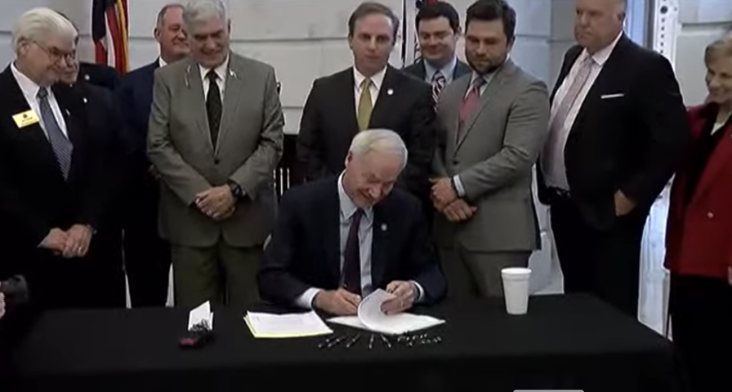Governor signs tax cut bills into law; special session adjourns without additional measures taken up
by December 9, 2021 1:43 pm 1,173 views

Surrounded by legislators, Gov. Asa Hutchinson signs tax cuts into law.
Gov. Asa Hutchinson signed the largest tax cut in Arkansas history into law Thursday (Dec. 9) following a three-day special session. The cuts reduce Arkansas’ top income tax rate from 5.9% to 5.5% next year and to 4.9% in the next four years if certain economic conditions are met.
The legislation would also reduce the corporate income tax rate to 5.3% over the same time period; combine low- and middle-income tax tables; provide for a $60 non-refundable tax credit from those individuals with an income of less than $24,700; index the standard deduction to the Consumer Price Index; and change a long-term reserve fund to a “catastrophic” reserve fund.
The total price tag for the tax cut when fully implemented will reduce state revenues by $430 million. Arkansas has a surplus of more than $1 billion and has more than $1.2 billion in reserves.
“I want to thank the General Assembly for one of the most successful special sessions in history,” Hutchinson said, singling out Senate President Jimmy Hickey, R-Texarkana, and Speaker of the House Matthew Shepherd, R-El Dorado. “We’ve put Arkansas in position for the future to be competitive to put more money in people’s pockets and that’s the design.”
Hutchinson noted that during his term as governor, there have been three previous major tax cuts, some of which were targeted specifically at low- and middle-income taxpayers.
“It’s not just about the term ‘cutting taxes,’ it’s about touching peoples’ lives,” he added. “Over time, it will continue to make a difference in their lives.”
Not every constituency was happy with the end result. Democrats overwhelmingly voted against the final tax cut measures in the special session, and advocacy groups like Arkansas Advocates for Children & Families said the tax cuts, which will total close to a half-billion dollars when fully implemented, were a missed opportunity.
“We’ve been asked, ‘How much is enough?’ when we advocate for better state funding for essential programs for Arkansans,” AACF said in a statement. “We will say ‘enough’ when 151,000 children aren’t living in poverty, when 41,000 kids ages 3 and 4 are attending preschool, when we don’t have 71 percent of our fourth-graders reading below grade level and 73 percent of our eighth-graders performing math below grade level. It’ll be enough when 43,000 children aren’t going without health insurance and when we aren’t ranked 49th in maternal health outcomes. It’ll be enough when we don’t have the highest teen birth rate in the nation.”
Gov. Hutchinson achieved another important goal with the special session – one that may have driven the necessity for the pre-Christmas get-together. State lawmakers passed an incentive package that altered recycling tax credits and moved $50 million into an economic development fund. The two measures were aimed at putting a final incentive package together for a $3 billion steel mill project in Northeast Arkansas. The huge economic project could create up to 900 jobs with average pay over $100,000 annually.
The governor said he believed Arkansas was the “in pole position” for winning the steel mill project and he hoped for a decision in the next few weeks.
The legislature completed its work efficiently despite efforts to extend the special session to consider bills ranging from abortion restrictions to Critical Race Theory. Lawmakers filed bills to deal with those subjects, but Gov. Hutchinson did not put them on the special session call. Votes in the Senate and House were thwarted Thursday when legislative leadership secured enough votes to adjourn the session “sine die.”
Sen. Jason Rapert, R-Bigelow, a Republican candidate for Lt. Governor, wanted to run a bill that would allow for private citizens to bring civil actions to any person or entity who helps with or induces an abortion. It is similar to a Texas law that has been upheld by federal courts as it works its way to the U.S. Supreme Court for consideration.
“This is a sad day for the unborn in Arkansas. The legislature had the ability to protect unborn Arkansans today and not wait for months for the United States Supreme Court to render its opinion. It is unfortunate that the political will needed from the legislative branch to protect unborn Arkansans from the crime against humanity that is abortion was ceded to the political agenda of the Governor,” Rapert said.
